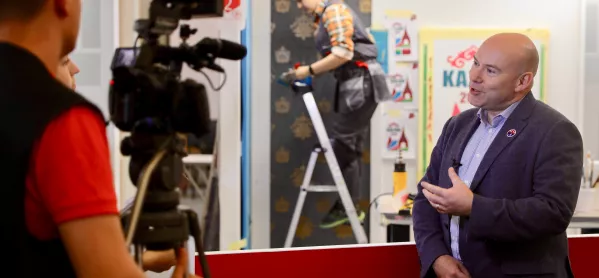
- Home
- Why more diversity would make WorldSkills even better
Why more diversity would make WorldSkills even better

“In Team UK, we do recognise that we have a diversity challenge - we’re really upfront about that,” says WorldSkills UK chief executive Neil Bentley-Gockmann.
The statistics aren’t great. Just 13 per cent of Team UK are female - there are five girls compared with 32 boys. Compared with other countries, the UK is not an anomaly. The team of host nation Russia is 19 per cent female. China, which will be hosting WorldSkills in Shanghai in 2021, has a team that’s 88 per cent male. Overall, just 21 per cent of competitors at WorldSkills Kazan are female.
This is a trend that Bentley-Gockmann is determined to address. Before he spoke to Tes, he was speaking at a panel meeting which was discussing the importance of getting girls into science, technology, engineering and maths (Stem) subjects.
Background: FE leaders challenge ‘silence’ on LGBT inclusion
News: ‘We’ve allowed skills to be invisible’
Opinion: ‘Let’s create a more tolerant and respectful culture’
And there are some grounds for optimism. This year’s GCSE results showed an increase in female entries in Stem subjects.
“It shows that all of this campaigning and work is having some sort of impact - which then shows that there’s still more to do. When you get results like that, it emboldens people to carry on,” says Bentley-Gockmann.
Diversity in WorldSkills
But he’s crystal clear: there’s still a way to go - and addressing this issue starts with leadership. He reflects on the discussion that came out of an LGBT roundtable that WorldSkills UK hosted in Parliament earlier this year, in partnership with Tes.
“One of the conclusions from the LGBT roundtable was around the absence of discussion about the importance of diversity and inclusion across the sector,” he says. “In leadership positions through colleges and training providers, the silence is deafening - what does it say about the importance that the sector is placing on these issues?”
The FE sector is passionate about social mobility, it’s passionate about helping - that much is blindingly obvious, Bentley-Gockmann says. But there’s a lack of organised debate: knowing that everyone believes in inclusion is not enough, there has to be desire to change.
Turning words into action
So what is WorldSkills UK doing to address the gender gap in Team UK, and inclusion more widely in the sector?
A piece of research, due to come out in November, will look at how diverse WorldSkills UK is, not just in terms of gender, but also for BME and LGBT students, disadvantaged young people and those with learning disabilities.
“We’re taking it really seriously,” Bentley-Gockmann says. “We have a responsibility in the broader FE and skills sector to be championing young people. As part of our ethos and values, we want to help all young people from all backgrounds. We can’t just say that and write it down, we have to do it as well.
“I’m very driven by wanting to make a difference, not just talking about making a difference. Whatever the recommendations are that come back to us - which we will be publishing - we will put resources into making that happen, whatever those recommendations are.”
He admits that the application process for WorldSkills UK isn’t inclusive. Young people are simply encouraged to apply. There’s no direct messaging from the organisation to, for example, 16-year-olds who have a 7 grade or above in Stem, encouraging them to register for competitions.
“We need to step up our efforts in making sure we are as inclusive as possible and being really explicit and saying to young women, in particular, ‘Come and join us, come and get involved in what we’re doing.’
“If you’re thinking about a career in engineering or technology, then come and work with us because we’ve got this really cool exciting programme that’s going to help you develop your skills and your confidence, and if you’re thinking about it, get involved,” he says.
Bringing the best talent
Being inclusive is not only crucial in terms of ensuring that every young person gets a chance to be involved in WorldSkills, but there’s a stark business case, too.
“How do we know that we’ve got the best team representing the UK if we haven’t had an inclusive approach to start with? How do we know that we’re absolutely the best?” Bentley-Gockmann asks. “We need to challenge ourselves and be more open and think, ‘How can we attract more young people from different backgrounds into our programme?’”
For the first time this year, WorldSkills UK asked people to identify their sexual orientation, so it can start collecting data - 5 per cent of young people who registered in this year’s national cycle identified as LGBT+.
Knowing this is a first step towards ensuring that the organisation is as inclusive as possible - and then retaining and supporting those young people in the cycle, says Bentley-Gockmann.
Register with Tes and you can read five free articles every month, plus you'll have access to our range of award-winning newsletters.
Keep reading for just £4.90 per month
You've reached your limit of free articles this month. Subscribe for £4.90 per month for three months and get:
- Unlimited access to all Tes magazine content
- Exclusive subscriber-only stories
- Award-winning email newsletters
You've reached your limit of free articles this month. Subscribe for £4.90 per month for three months and get:
- Unlimited access to all Tes magazine content
- Exclusive subscriber-only stories
- Award-winning email newsletters



